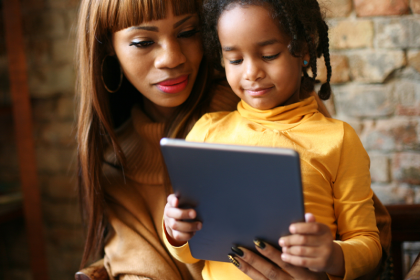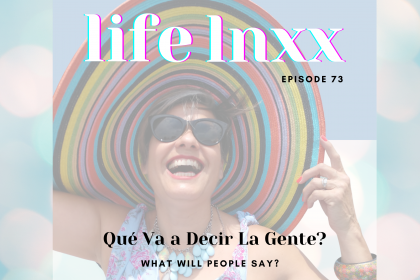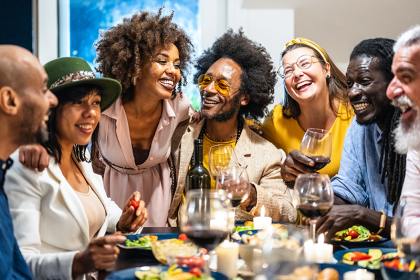[INTRO]
Grandmothers Are the Matriarchs of Our Past
In this episode, I am sharing a story that probably resembles one of your own, so together we can embolden this International Women’s Day. It’s the story of my grandmother, mi abuelita, Maria Louisa Menendez of Peru and how she influenced who I would become. Because living with her from when I was born, I grew up seeing possibility. That regardless of gender, regardless of age, regardless of physical abilities, you can do remarkable things. So my first visions were definitely without bias and it would only become later in entering into the system of schooling and work and society in general when the bias became really heavy.
She’s definitely my Life Link, the person I resonate with the most, and in whose presence, I make total sense. If I hadn’t known her, even a little bit, I would still be wondering where I come from because I am so different from my siblings and parents. I do have resemblances but the majority of who I am is definitely associated with my abuelita.
I love emphasizing this to all of you because it’s such a common feeling that goes unanswered if we look only to our immediate family for trying to understand. It’s so comforting to realize your role in the world at a time when you feel that you are alone in your journey.
My grandmother’s story exemplifies the traits that ripple through women we celebrate now; persistence through struggle, love of family, intelligence to figure out life on her own and the embrace of women supporting her. All the qualities and life moments that many women are blessed to come from and be comforted by the lessons that are learned from that.
What Women Have Taught Us
With that, let’s celebrate all women on this International Women’s Day, especially in our global audience, for all they have provided for us here today. When you consider the amazing lives and celebrations of women in the era they thrived, you realize women have always been incredible for humanity. Just incredible, in what they fought for, achieved, created, attempted, usually with only the support of other women. This persistence is thriving today given the barriers broken down by the women who came before us and those here today and for that we are celebrating, for that we are joyful.
So, viva! To our sisters in amplifying our potential, speaking to our values and celebrating our successes.
Most of what I know about my grandmother are from the stories my mother told me throughout her lifetime. My abuelita lived with us when my mom encouraged her to leave home and travel thousands of miles from Peru to California when she was 60 years old. But, she died when I was only 8 and as you know from Episode 21, I couldn’t have a conversation with her because my mom didn’t want to teach me Spanish and my beautiful grandmother didn’t know English.
Still, I have a lot of memories with her that make me laugh but also freak out because of the situations we were in when I was really little. Even at that age though, I felt she was so different than any woman I knew and that just made her mesmerizing to me. I loved being with her because of her beautiful spirit, her twinkly eyes and her determination to do whatever we were doing even though she was crippled with rheumatoid arthritis.
But, it was my mother’s stories of when she was little that really sealed my adoration for my abuelita. It was from these stories that I understood where I got my rascally nature from. My poor mom had that in stereo between the two of us, between me and my abuelita. My mom had it in her too but she kept it under wraps. Something that we didn’t find necessary.
My Grandmother From Peru – Maria Louisa Menendez
So a little context for Maria Luisa. She was born in 1900. Married my grandfather, who was a Spaniard, and together they built a fabulous business of growing sugar cane down in the valley, outside of Arequipa, in the south. And they are very successful, but living in a remote area much like many agricultural locations and so that alone in the 1920s is remarkable. But, what really brings forth her bad-ass Chica nature is that in 1930, so she was 30 years old, she’s had four children, is pregnant with her fifth, lost the two oldest to the flu epidemic at the time, and also loses her husband that year, at the age of 33, from walking pneumonia.
So in 1930, she’s single, newly widowed, pregnant, with two girls, ages two and four years old, and inherited the sugar cane ranch from her husband. This alone right now is making me freak out even now because pregnant, newly widowed, single, two children, two and four years old, running a business by yourself. Oh, Yes! This is a good reminder that much of what we worry about today has been done before and if we just look to these women, we will learn so much on how to do it. But also I think to relax, to step back and realize there’s a whole bigger picture out there of what’s been done before and people who thrived and who we’ve loved.
Now, at this time, there is no challenge to a woman running this major business and it’s readily accepted that she is La Doña, La Jefa. She was in charge of not only the ranch, but also the store she created because she knew that people in this remote area wouldn’t have access to dry goods and food and things that they needed, like fabric for making their own clothes. And she also became like the doctor of the region. Because people would get injured and again, remote locations, she would know how to heal them, how to take care of boils, fevers, stomach ailments, all from homeopathic remedies that had been passed down through the generations.
It helped that she was also indigenous because I really feel like most of the knowledge came from her mother of having to heal homeopathically and also how to care for people, how to support the family?
So my own mother grew up with a single mom with three girls and there was never an issue about that. She was not ostracized or made to feel bad about the situation because her mom was running the sugarcane ranch. She was not at threat for being financially destitute. She did not have to give up her career to take care of the children because there were people within the village that would help her with it, support her.
Women Owned Businesses and Guns
My mother always told me about this large carved chest that my grandmother had in her room. And in that chest was basically everything that needed to be protected. It was her safe, so to speak.
And it had this big key, like the kind you see in the movies, that my mother was the only one of the kids that was allowed to ever use the key to open that chest. And it would be the records and bookkeeping for the two businesses, her little store and the ranch, and the papers for ownership but also, what was in there, was her Pearl handled pistol.
That’s right. Pearl handled pistol. Now, when I heard that story, and I was probably around six, it’s like, “Oh my Lord” because my grandmother was all of four foot ten. She was tiny. She was even smaller by the time I knew her because of the crippling arthritis.
Now, I never knew the story of why she had the pistol. But, when you’re a little kid and you’re looking at your own mom, who’s raising you with these kid gloves and then you look at your tiny little abuelita, who’s crippled with two canes, and, you know, she’s raised your mom with a Pearl handled pistol, it just corrects your sense of what life could be like.
Granted, it was a different era, but my mom had erased that part of our DNA by the time I was born. So here was my little abuelita raising three girls on her own and yet not alone. One of the families who they became best friends with, mother, father, three daughters, just embraced them as one of their own and made sure they were always okay. Having been in my grandmother’s position, single mom, granted only two daughters, but having someone align with you and be supportive of you, making sure that you’re okay, that changes everything, that makes you feel like you can do anything.
Women Knew to Educate Their Children
This is the beauty of her culture and the beauty of the diversity. I really want to promote here in the U. S. Don’t lose your love of culture because with it comes this great caring. This love to take care of other people and move through life, even in struggle, with such joy and determination to passionately live with purpose.
I associate it with my culture because I didn’t experience it on the American side of my family as much as I did on my Peruvian side. My grandmother wanted to ensure that her daughters were educated. Now I’m not sure about her education. I’m going to guess that because she married so young, maybe she didn’t have any further education.
Again, this is 1935. She sent her daughters to boarding school to get an education, sending them into the city, to live by themselves, solely to see her during the summer because it was too far away for the weekend and she did this as a single mother.
Now, granted the times are different. If we still had that kind of support, and that kind of accessibility into education for our own children, it wouldn’t be so difficult.
But this is a good time to pause, to realize that if you’ve been in this situation or you’re worried about this situation, it’s not your fault. This has been done before and without the feeling that you’re not good enough, that being a single mom is your fault. Or, that raising your children and not being able to afford a good education or afford childcare or afford extra things is your inability. It’s not, it’s definitely societal.
My grandmother was able to do it because the culture supported her. And because of that, she was able to give her daughters, my mother and aunts a step into a career. They all had careers. When they came here to America, they were able to step into business.
Women Lose Support In Different Cultures
My mother had an English certificate from Cambridge University. She took that upon herself to learn because she wanted to work in Arequipa, in the British Consulate and that’s how she met my dad. So, I think she was stepping into destiny at that point. Or, maybe it was her witchy powers. Something told her she needed to be in the British Consulate in order to meet that guy, Jo, from Wyoming.
But you can see how generation to generation, if society supports you in raising children and caring for women and providing that they continue to get that access, amazing things can happen.
Flash forward 25 years and it’s 1960, she’s 60 years old. My mother encourages her to come to America to live with our family. And within 10 years, my abuelita is gone.
Something about coming here really changed her. Romantically, admittedly, I like to think it was a broken heart. That something about leaving her beautiful, loved country, just changed her.
So within 10 years, she developed Diabetes and high blood pressure and the rheumatoid arthritis that she didn’t have prior. I had very little time with her. I was eight years old when she passed so I had very little time cognitively with her. But there were two memories that are so vivid, so strong because they were probably daily occurrences.
Again, even when I was little, I was just mesmerized by her. One of the memories is that in our home growing up, we had one of those Great rooms where everything spills together, like a family room, with a TV. And in front of the TV was her chair, this beautiful Queen Anne winged chair that nobody else could sit in. You did not sit in that chair. It was only for La Reina, the Queen, my grandmother.
Women Bridge Different Cultures
There were these TV shows when I was little. You probably have heard of them. The Three Stooges. I know, no commentary, I know. The Three Stooges and, and also a comedy skit by Red Skelton. Admittedly, it was really hilarious.
Even though she didn’t speak English, my grandmother insisted that we always go get her when those shows were on, because she would be in her bedroom. We would always go knock on a door and help her walk to her chair, her throne.
For all the theatrical people in the audience, you have a gift, a severe gift that crosses cultures, language, any barriers, because even though she didn’t know English, she would watch those shows and laugh hilariously throughout the show as if she knew what they were saying.
I just love that. I felt so close to her that even though we couldn’t speak to each other in our language. There is something universal to us as women, as humans that cuts through. It’s because of these actors.
Now the other memory was just a reminder what a Bad-ass Chica she was. I know that I could not do what she did, which again, just really put some context into your current day, into your current worries. At the point she had rheumatoid arthritis, her hands were so crippled. This is going to make me cry. Her hands were so crippled that they were bent closed.
Her fingers were basically touching her palms. All of them, on both hands. And yet, she loved to crochet and she loved to knit. I remember as a little kid, one, not knowing how to do either to this day. I don’t know how to do either. But then, seeing her with basically these closed hands, yet able to take these needles and create these amazing things with her crippled hands. This very delicate, very intricate crocheting just blew my little seven year old mind. I do not understand how she could possibly do it.
How to Keep Memories of Women in History
And again, because of my culture, because of what I hold dear to me, I kept everything that she ever touched. I’m no Marie Kondo. I have the birthday card she gave to me. I have a hat she crocheted for me and I have the matching outfits she made for me and my mom that were loosely crocheted.
They were kind of scandalous at the time now that I realize it because this is the sixties. So my mom and I had matching outfits as mini skirts. My mom wore miniskirts, but I was not allowed to as a teenager or young woman. But, she wore the mini skirt that my grandmother made.
If you caught the video, I put the video up on our Twitter feed and I’ll probably make a real out of it. I’m wearing my mom’s version. It’s this long vest open and a matching mini skirt. I thought, gosh, I don’t know if my mom suggested she make it, or if my abuelita felt compelled to make it. Because she knew the love between mother and daughter.
I have no idea where this idea came from. I can’t believe it would have come from my mom because she was a little more cautious about that, a little more modest, but my grandmother, making these mini skirts at the time and with these crippled hands, I will never, ever release that. I think I’m going to be buried with it, honestly, just to ensure that they’re never lost.
You can see where I had such a powerful model, even though it was very short, in learning from my abuelita, from learning from my grandmother, of just how to endure going through your life situation with this powerful sense of individuality and personality and unwillingness to be held back. Or, add it into a situation where your own personality gets diluted.
Lessons Learned From Women
She stayed true to who she was all the way through the end. But I learned from her
of being a single mother, literally with the same age daughters. How crazy is that? That I became a single mother at near the same age she was. I, also, had a two and a four year old daughter when I became a single mother.
I didn’t have the Pearl handled pistol, but I knew that I would be okay. I knew if I loved them and treated them with that adoration and respect and gave them an education, that the least that would happen, was they would have the opportunities that I knew my mom had. And my mom had become so successful.
But also carrying the culture and the culture was so important because it was the culture, the Peruvian culture that my mom brought forward, that really developed that love of each other and love of family. How you take care of each other from the moment you’re born to the moment you have your last breath.
And that’s how it worked out. With my beautiful family, my beautiful daughters. And they, too, are so successful. One at Apple. One at Google. Living their life filled with the same cultural understanding. We just pass it from one generation to the next.
How you push through struggle in the name of loving your family, encouraging them to yes be independent, but stay within this beautiful canopy of our culture. And to not leave it behind, but to pass the stories forward because we don’t know who our Life Link is and how much of them we resemble unless we know their stories.
Share Stories of Women From the Past
So continue to pass on the stories of the women, you know. Generations back or current day. But let’s get caught up a little bit with a generations back because we don’t want to lose them to time. We don’t want to lose knowing their stories by having the people who know them no longer here.
There’s an article on our website at lifelnxx.com. That’s L N double X, written about Maria Luisa. Menendez. So that you can see the pictures of her and they give context to what I’m saying here. I’d love to have a show on this because it’s just remarkable who she is and who I come from.
A big shout out to all the single moms out there doing your career, loving on the next generation stepping into our humanity. We love you. We support you. And if we are not shame on us. We’ve got to do more.
Seeing the impact in my own family of what happens when you’re supported is a perfect model to put out there for any society. We love you ladies.
Step into your truth, ladies. Ciao.
[Outro]




